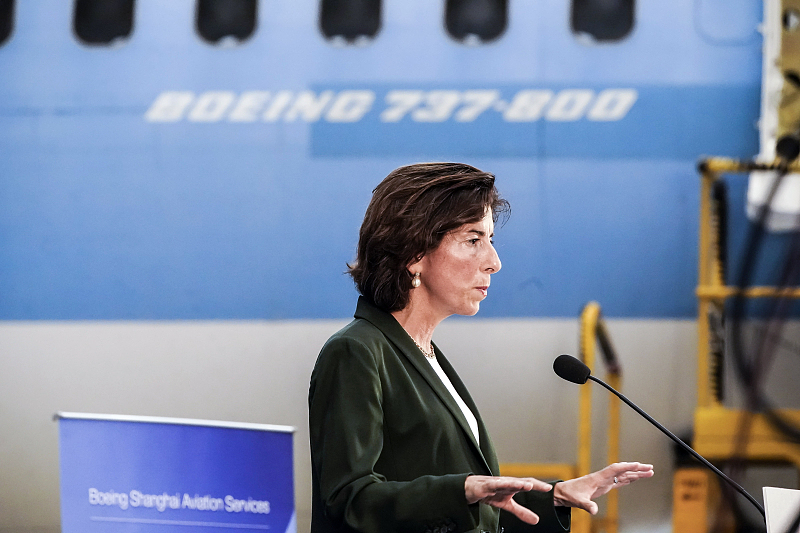
Consumers go shopping at a shopping mall in Kunming, southwest China's Yunnan Province, January 1, 2023. /Xinhua
Consumers go shopping at a shopping mall in Kunming, southwest China's Yunnan Province, January 1, 2023. /Xinhua
Editor's note: Bobby Naderi, a special commentator on current affairs for CGTN, is a London-based journalist, guest contributor in print, radio and television, and documentary filmmaker. The article reflects the author's opinions, and not necessarily the views of CGTN.
The vibrant Chinese economy has been the subject of numerous reports in Western media in recent years. These stories frequently portray China's sluggish economic growth and capital outflows as the inevitable results of a government that is becoming more and more intrusive. A closer look at China's economic environment, however, offers a different picture that refutes the myth of economic instability and emphasizes the value of gradual liberalization and reform over state interventionism and control.
China's economic miracle is considerably more due to entrepreneurship and gradual liberalization than to the increase of state control. It is crucial to recognize the contribution of hard work, pragmatism, entrepreneurship, and the rule of law to China's historical success and potential for the future as it navigates the difficulties of economic transformation. Certainly, simple accounts and illusions of market chaos fall short of capturing the complexity of China's continuous transition and performance since the tale of its economic rise is far from over.
The financial environment
Unease over investor sentiment in financial markets has been raised in Western media by the fact that China's manufacturing sector has shrunk due to the slow growth in the real estate industry. However, it oversimplifies the situation in the market to say that these are the only causes of the outflow of foreign investment.
Even while the volume of foreign investment is less than previous years, the government's dedication to resolving the problems in the real estate sector shows a willingness to assuage concerns and stabilize the market.
This year, foreign investors' attention has turned from broader stimulus expectations to a more focused bailout for real estate developers. Investors' more discriminating attitudes are reflected in this shift in expectations, which calls for a more focused and efficient method of resolving concerns in this vital sector. It is crucial to remember that this shift in investor mood does not equate to a full exit from the Chinese market.
The foreign investors' cautious stance has surely been influenced by the ongoing tensions with Washington. The remarks made by U.S. Commerce Secretary Gina Raimondo, during her visit to China, seem to indicate that geopolitical tensions are impacting investment decisions in the stock market. Nevertheless, interpreting these comments as indicating that China is "uninvestable" oversimplifies the forces at work. Political risk is a worldwide occurrence, and diversifying portfolios helps global investors deal with such uncertainty.

Gina Raimondo, U.S. Commerce Secretary, speaks during a news conference in Shanghai, China, August 30, 2023. /CFP
Gina Raimondo, U.S. Commerce Secretary, speaks during a news conference in Shanghai, China, August 30, 2023. /CFP
Investor sentiment is complicated and affected by a wide range of variables, such as economic data, the political environment, and world events. Even if the financial markets' recent data is noteworthy, it does not indicate that foreign investment has left China. It indicates an adjustment in market expectations and a demand for a more focused economic policy.
The economic environment
China has been able to establish itself as an important trading partner for nations all over the world thanks to its adherence to international law and the concepts of comparative advantage and open markets.
The world's second largest economy has made significant investments in research and development, particularly in industries like biotechnology, 5G technology, artificial intelligence, and chipsets. Due to its dedication to innovation, China is currently leading the world in technological innovation. The openness of the financial sector has increased foreign investment and established Chinese financial institutions as major actors on the international stage. The Renminbi's internationalization demonstrates China's goals in this regard.
In the broader context, the transition of China's economy to a consumer-driven one has been crucial in maintaining the current development. Due to its expanding middle class and rising spending power, China has become a popular market for international corporations and investors. Despite claims to the contrary from some Western media sites, China's economic miracle appears to be continuing.
Even if it has slowed from the double-digit rates observed in the early 2000s, China's economic growth is still strong. Its GDP keeps growing at a rate that many industrialized nations can only envy. Some of the top tech firms in the world, like Alibaba, Tencent, and Huawei, are based in China. Additionally, it leads the world in emerging industries like electric vehicles and alternative energy. These accomplishments show that China's technological dominance is still very much alive and well.
What's more, through the Belt and Road Initiative, China has continued to invest in infrastructure and green energy projects all over the world, demonstrating its commitment to advancing global development. Coming to grips with this increasing wreck of a planet, China's resilience and adaptation in the face of global economic crises are still on display.
Despite the difficulties in recent months, China's economic development has been exceptional and will continue to influence the Global North and Global South for some time. The decrease in real estate stock prices offers a good opportunity to buy premium assets at competitive prices. Even in the face of an otherwise gloomy external outlook, multinationals see the market as an alluring and viable investment opportunity.
Instead of exaggerating the situation in the real estate market or prematurely announcing the end of China's economic miracle with such reckless abandon, Western media outlets and "China watchers" would be better served by recognizing the durability and vitality of the Chinese economy as a builder of world peace, a contributor to global development, and a defender of the international order.
(If you want to contribute and have specific expertise, please contact us at opinions@cgtn.com. Follow @thouse_opinions on Twitter to discover the latest commentaries in the CGTN Opinion Section.)